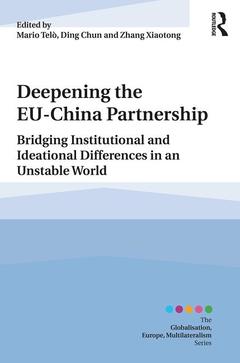Deepening the EU-China Partnership Bridging Institutional and Ideational Differences in an Unstable World Globalisation, Europe, and Multilateralism Series
Coordonnateurs : Telò Mario, Chun Ding, Xiaotong Zhang

The China-EC/EU relationship, started in 1975, is a highly institutionalized, multidimensional and complex, but to some extent controversial international partnership. It is also challenged within the current unstable world.
This book addresses the convergences and the differences (ideational, political, institutional and interests-related) between China and the EU by a collective interaction between Chinese and European scholars. Among other things the book assesses sectoral bilateral dialogue and focuses on the interplay between internal complexity and external policies, discusses ideational divergences in international law and rule of law and in many relevant policy fields. Furthermore, it compares sustainable growth policies; explores trade and investment controversies and negotiations, human rights dialogue; and addresses environment and climate change policies.
This text will be of key interest to EU studies and politics, China studies and more broadly to area/Asian studies and international relations/global governance.
Foreword [HE Yang Yanyi RPC Ambassador to the EU Brussels] Foreword [J-M De Waele, ULB Vice-Rector and A Weyembergh, IEE President] Part I: Introduction Introduction [Mario Telò, Ding Chun, Zhang Xiaotong] Part II: Multipolarity, Multilateralism and Foreign Policy in the Current World Disorder 2. China and EU General Foreign Policy Strategy [Zhou Hong] 3. European and Chinese Multilateralism at Stake: Political and Theoretical Implications [Mario Telò] Part III: Assessing the Bilateral Institutionalized Cooperation 4. The EU-China Partnership: Institutionalization and the Limits of Liberal Logic [Andrew Cottey] 5. China’s Belt & Road Initiative and its Opportunities and Challenges [Jing Men] Part IV: Increasing Internal Complexity of External Policy Debates 6. The China-EU Partnership: the Development and Role of Think Tanks [Silvia Menegazzi] 7.The EU, China and the WTO: Squaring the Irresistible Force Paradox of the MES Issue [Frédérik Ponjaert and Stéphanie Ghislain] Part V: Balancing Principled Divergences and Convergence 8. Seeking the Rule of Law as the Common Goal: EU-China Cooperation in Combating Commercial Bribery [Li Yuwen and Bian Chen] 9. EU-PRC Relationship and the Interpretation of United Nations Peacekeeping Norms [Zhong Zhun] Part VI: Comparing Sustainable Growth Policies 10. Socio-Economic Models: Comparison and Interaction [Ding Chun] 11. Sustainable Growth in China and the EU: Competition or Cooperation? [J-C Defraigne] Part VII: Trade, Investments, Financial Issues 12. Linkage Power: How the EU and China Managed Their Economic and Trade Relationship (1975–2016) [Zhang Xiaotong] 13. China-EU Financial Cooperation and the AIIB: From Trade Partners to Global Investment Partners [Zhao Ke] Part VIII: Consolidating Flows at Knowledge-Economy Levels 14. Strengths and Weaknesses of the Research and Academic Cooperation [Yuan Feng and Li Ying] Part IX: Environment and Climate Change 15. China Climate Change Policy [Bo Yan] 16. Climate Change and Target Implementation Strategies Before and After the C21 Paris Conference: Convergences and Divergences [Coraline Goron and Duncan Freeman] 17. Conclusions [Mario Telò, Ding Chun, Zhang Xiaotong]
Mario Telò is member of the Royal Academy of Sciences Brussels, and Professor of International relations at the ULB, Brussels, and LUISS, Rome, Italy.
Ding Chun is "Jean Monnet Chair", is Professor of Economics and Director of the Centre for European Studies, as well as Dutch Study Centre at Fudan University, Shanghai, China.
Zhang Xiaotong has a PhD in Political Science from ULB, is Associate Professor at the School of Political Science and Public Administration, and Director of the Economic Diplomacy Centre at Wuhan University, China.
Date de parution : 11-2017
15.6x23.4 cm
Disponible chez l'éditeur (délai d'approvisionnement : 14 jours).
Prix indicatif 160,25 €
Ajouter au panierDate de parution : 11-2017
15.6x23.4 cm
Thème de Deepening the EU-China Partnership :
Mots-clés :
Chinese Government; Chin Ding; EU China Relation; Mario Telò; EU China Relationship; China; EU Member State; Climate Change; EU China Partnership; Human Rights; China’s EU Policy; European Union; EU China Talk; Ding Chun; China EU Summit; Zhang Xiaotong; Zhou Hong; EU China Human Right Dialogue; Andrew Cottey; ASEM; Men Jing; EU’s Proposal; Silvia Menegazzi; UN; Stephanie Ghislain; Grant China MES; Frederik Ponjaert; EU’s Interest; Li Yuwen; Cop; Bian Cheng; Global Climate Governance; Zhong Zhun; China National Bureau; Jean-Christophe Defraigne; China EU Strategic Partnership; Zhao Ke; China’s WTO Accession Protocol; Li Ying; Commercial Bribery; Feng Yuan; Juncker Plan; Bo Yan; North American Free Trade Agreement; Coraline Goron; EU Firm; Duncan Freeman; Joint Presidential Statement



